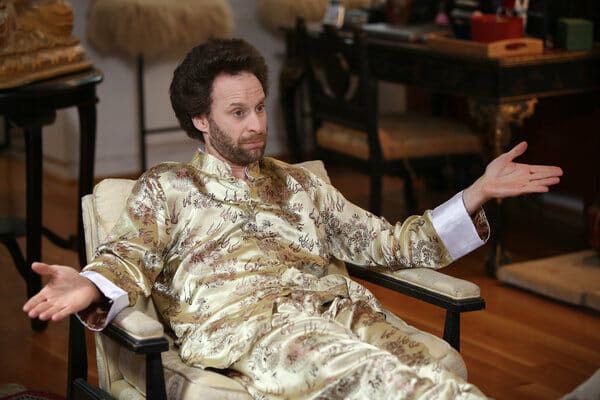Parks and Recreation: “Flouride”/”The Cones of Dunshire” (Episodes 6.8/6.9)
TV Reviews Parks and Recreation
Parks and Recreation never quite figured out what to do with Councilman Jamm, but that hasn’t stopped him from becoming an integral part of the show. However, there’s a problem with this, because as a human being, he doesn’t make much sense. The show has a similar situation with Donna at the moment, which came to the fore in the first of last night’s episodes, but it was really Jamm who was the driving factor for the evening, and in one case his storyline worked well. In another it didn’t. It was how the episodes used him that mattered, and the odd thing about it is that when Jamm isn’t treated as a serious character, he makes the rest of the show function far better, going against the conventional wisdom that more rounded characters mean a better show.
That’s because Jamm is ultimately a villain, and when he’s simply there to act as an antagonist his metaphorical existence takes on the larger-than-life needs of Parks’ stories. He’s a stand-in for everything that’s wrong with America’s political process, a person not just corrupt but actively attempting to do what’s wrong. His hero is Lex Luthor, “because he’s rich.” What’s more, he rarely gets any real comeuppance because that goes against his role in the government as that sort of implacable wall of ineptitude and selfishness that impedes any sort of progress. As a symbol, he is excellent, and what we saw of him in “Fluoride” is exactly that. He’s a comedic villain, sure, but that doesn’t make him any less execrable.
But in “The Cones of Dunshire” there was once again an attempt at humanizing him, and this fell flat. His orientalism is of course racist and sad, but it’s also presented as a cute quirk, another facet of a person who’s easy to dismiss. And while Jamm is entertaining, he shouldn’t be cute, so these jokes don’t really work. He’s a person actively trying to harm his community, and attempts to dress him in funny clothes or make him sing ignore that fact in an odd way that feels even stranger when juxtaposed with his efforts in “Fluoride.” It’s one of the things that really makes this storyline never quite land (as does a return to Leslie’s fixation on Ann’s move). Ultimately, some of the characters in Parks are best left as caricatures in the same way that The Simpsons was better when you didn’t necessarily know what the Sea Captain did during his leisure hours. Spending more time with Jamm only serves to illustrate the way he couldn’t function as a human in the way that, say, Ben or even Andy could.
Another function of both episodes was to give Donna more screentime, which was interesting because in some ways her character has a similar problem. She, April, and Craig (three cheers for more Billy Eichner on Parks) decide to find the spirit dog for everyone in their office, but April gets Donna’s wrong. Donna’s mad about this, but even after April gives her an interview about herself it’s impossible to fit her to something. What Donna’s interview reminds us of, though, is that she filled with contradictions and that, as a minor character, that’s always been fine in the past. Hearing tiny bits about what she does outside the office has always been wonderful, but it’s incredibly difficult to picture a person who could do all of that and exist. Fortunately, though, because Donna isn’t largely a metaphor like Jamm, she sustains herself through this criticism, and April characterizes her, quite fittingly, as a cat.
“Fluoride” was a much stronger episode, both because of the problem with Jamm and because its main story was about politics while its b-story was more focused on characters. That seems to be the right ratio for Parks most of the time, the exceptions usually being when there’s a bigger emotional moment on the line. The third story, with Ron and Chris bonding over cribs for their future children, was sweet and small and had a few really killer comedic moments, none of which detracted from the fantastic political satire going on in the rest of the episode.
The other two stories in “The Cones of Dunshire” were more interesting than the lead, particularly the few minutes spent with Ben as a full-fledged accountant, which lasts exactly one day. Selling Ron’s cabin wasn’t quite as interesting, as it was pretty similar to other Ron-based stories of the past. One of the better things about Parks’ constant momentum is that it keeps the show from repeating itself quite so much, but it’s still clearly in a transition period, so the show has gone back to more or less an old standby. It was still funny material, though, and while it wasn’t terribly surprising, I’m sure Ron’s rabid fanbase loved hearing the hipsters admire his moustache before being yelled out of the cabin.
It’s been a tumultuous, disjointed season so far, and this seems like an odd note for Parks to end the year on. But it’s a bit fitting, as Parks is still trying to figure out what the show is at this point, considering its changing cast and character relationships. What couldn’t be said about any part of either episode, even Ron’s cabin, was that they were dull, even for a scene. The jokes and performances were as excellent as ever, and if nothing else it’s exciting to see everyone scramble Parks’ basic elements around. At this point nearly everyone on the show has changed jobs, and the cast is slightly different with almost every episode, but it’s still undeniably the same Parks and Recreation that everyone has loved since the second season.